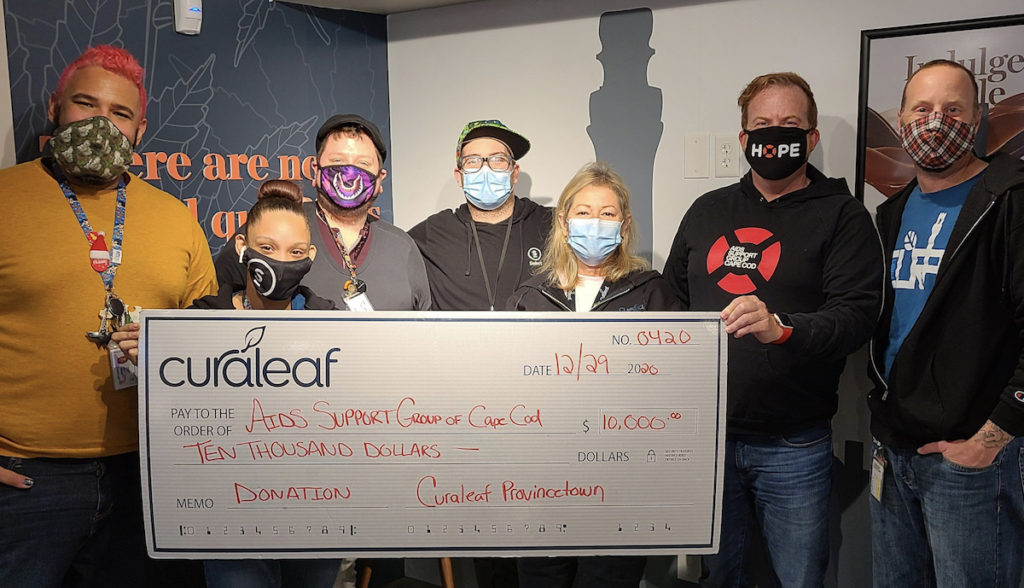
PROVINCETOWN — A long-anticipated source of new tax revenue was confirmed last week when Provincetown reported fourth-quarter payments from Curaleaf and b/well, the two cannabis dispensaries that opened here in 2020. The town took in $480,000 in taxes and fees for the year.
That corresponds to about $8.7 million in total sales, despite the pandemic and decreased tourist traffic.
Curaleaf opened its doors on Jan. 29, 2020, closed again in late March for the lockdown, and reopened on May 25. B/well opened for business on Sept. 4.
Even though there were no pot shops open for three months of the year, tax payments indicate that Curaleaf had gross sales of $7.3 million, and b/well sold about $1.5 million.
More cannabis stores are expected soon in Provincetown, Wellfleet, Eastham, and in the mid-Cape. Too many variables make forecasting future revenue difficult, but significant growth is likely.
Three Plus Three Equals Six
Retail cannabis shops send money to town coffers in two parallel tracks. Three percent of sales revenue is collected by the state and forwarded to town governments as a “local option tax.” Separately, towns negotiate a host community agreement (HCA) with each retail outlet, and most HCAs include a “community impact fee” of 3 percent of sales.
Both streams of money go into a town’s general fund. Local option tax revenue can be used for any municipal purpose, but not “community impact fees,” which are meant to offset the negative consequences of having pot shops.
In guidance published on Jan. 16, 2020, the Cannabis Control Commission (CCC) specified that impact fees should “bear some reasonable relation to the costs” that towns experience as a result of the cannabis industry. Costs cited by the CCC included traffic studies, public safety personnel, inspections, and substance abuse programming.
Host community agreements must be renegotiated every five years, and community impact fees are not guaranteed. In renegotiating them, towns need to document the costs they face and how the money will be used.
Plus One: Charity, Service
Separate from taxes and fees, Provincetown’s HCAs require cannabis retailers to donate 1 percent of their gross revenue to local nonprofits, and to perform 100 hours of community service per year.
This is a common arrangement — according to an investigation by WGBH in Boston, about two-thirds of the almost 500 HCAs they examined require charitable giving and/or community service from dispensaries.
These provisions have been called into question by retailers and the CCC, however, and last February, the state House of Representatives passed a bill that would strike them from the agreements. It never reached a vote in the state Senate.
Though Provincetown had planned for dispensary contributions to go into a town-administered grant fund, the town counsel has not yet advised whether that’s appropriate, Assistant Town Manager David Gardner said.
“There has been considerable pushback from the dispensary association about extraction of fees above and beyond the 3 percent allowed by the law,” said Gardner. “There was also the criminal complaint against the mayor of Fall River [for extortion of cannabis retailers], as well as the subsequent investigation by the FBI into how towns implemented the host agreements. We feel it is prudent to wait to see the issue play out.”
Instead, Curaleaf and b/well have both agreed to donate 1 percent of their gross revenue to various charities on their own, Gardner said. “Curaleaf is at their one-year anniversary, and they’re willing to complete their 1 percent requirement,” he said. “Nobody is kicking and screaming for them to comply — they’re doing it eagerly.”
According to Casey Sherman, a publicist for Curaleaf, it recently donated $10,000 each to the AIDS Support Group of Cape Cod and Provincetown LGBTQ Welcome Center, and $5,000 to the Provincetown Scholarship Fund. Donations were also made to the Soup Kitchen in Provincetown, Carrie A. Seaman Animal Shelter, and Marcey Oil’s hardship fund. Curaleaf employees have already done more than 300 hours of community service, Sherman said.
Gardner noted that employees of Curaleaf were the primary volunteer support for three different town elections in 2020. “They were at least two-thirds of the people in the auditorium running the national election, both the early voting and for election day,” he said. “At the outdoor town meeting, they had six or eight people there — the whole perimeter security was Curaleaf.”
The principal owners of Curaleaf, whose headquarters are in Wakefield, are Russian oligarchs.
B/well has committed to community service as well, said owner Karen Nash of Provincetown. “When we hire people,” she said, “we tell them part of what we’re doing is giving back to the community — people really like that. Around Christmas, we delivered meals to elderly people. They want to do beach cleanup when it’s a little warmer. And I’ve already committed us to the dog park.”
Though b/well hasn’t started its donation program yet, “I’m glad we have the whole summer before my anniversary date comes up,” Nash said, adding that she likes being able to choose where the money goes. “I’d much rather build a direct relationship with charities than just surrender it to the town.”
Editor’s note: This story has been corrected to note that $480,000 is the annual, not the quarterly, town revenue from marijuana sales.



